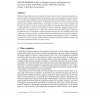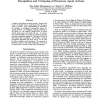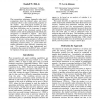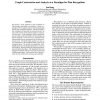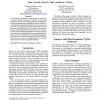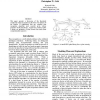151
click to vote
AAAI
2011
14 years 2 months ago
2011
Plan recognition is a form of abductive reasoning that involves inferring plans that best explain sets of observed actions. Most existing approaches to plan recognition and other ...
136
click to vote
FLAIRS
2009
14 years 11 months ago
2009
In this paper, we investigate the hypothesis that plan recognition can significantly improve the performance of a casebased reinforcement learner in an adversarial action selectio...
139
click to vote
LOGCOM
2002
15 years 1 months ago
2002
We present a logical approach to plan recognition that builds on Kautz's theory of keyhole plan recognition, defined as the problem of inferring descriptions of high-level pl...
127
Voted
AAAI
1996
15 years 3 months ago
1996
Anagent can performerroneous actions. Despite such errors, one might want to understand what the agent tried to achieve. Suchunderstanding is important, for example, in intelligen...
111
click to vote
AAAI
1994
15 years 3 months ago
1994
To coordinate with other agents in its environment, an agent needs models of what the other agents are trying to do. When communication is impossible or expensive, this informatio...
AAAI
1994
15 years 3 months ago
1994
Plan recognition techniques frequently make rigid assumptions about the student's plans, and invest substantial effort to infer unobservable properties of the student. The pe...
132
click to vote
AAAI
2000
15 years 3 months ago
2000
We present a novel approach to plan recognition in which graph construction and analysis is used as a paradigm. We use a graph structure called a Goal Graph for the plan recogniti...
112
click to vote
FLAIRS
2001
15 years 3 months ago
2001
This paper presents a probabilistic and abductive theory of plan recognition that handles agents that are actively hostile to the inference of their plans. This focus violates a p...
108
click to vote
AAAI
2004
15 years 3 months ago
2004
We describe the application of plan recognition techniques to support human intelligence analysts in processing national security alert sets by automatically identifying the hosti...
114
Voted
AAAI
2004
15 years 3 months ago
2004
This paper presents a discussion of the theoretical complexity of plan recognition on the basis of an analysis of the number of explanations that any complete plan recognition alg...

